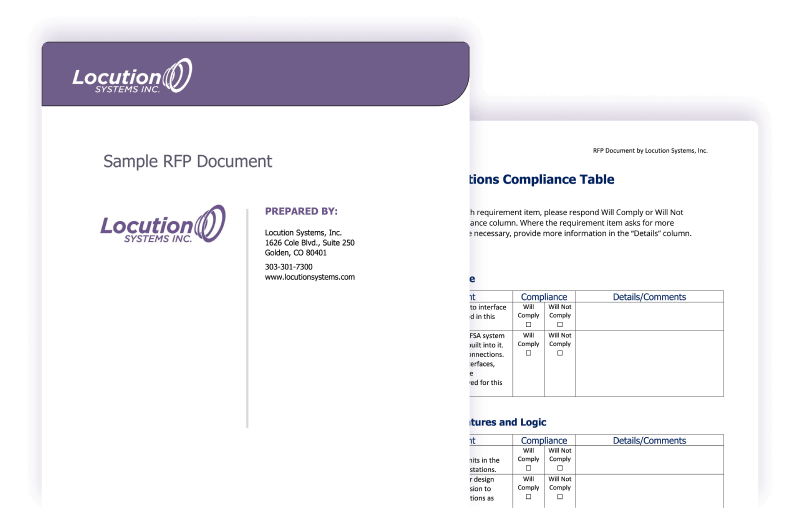Fire Station Alerting
Top 10 Considerations When Choosing an FSA System
There are lots of considerations when choosing a new Fire Station Alerting (FSA) system. We have consolidated our top 10 to help guide you to your desired FSA system.
01. Desired outcomes
When shopping for an FSA system, it helps to prioritize the main benefit you hope to receive from the system. As a result, we often hear about wanting to reduce response times, improve dispatch clarity, or improve first responder sleep quality. Each system has a specialty, and prioritizing your needs is crucial to best align the system with your desired outcome.
02. Compatibility
Most fire station alerting systems integrate with your CAD and radio to effectively relay their information to responding units. With that said, not all FSA systems integrate with all CAD and radio systems. Therefore it is necessary to consider the system’s compatibility with CAD and radio systems early in the buying process. Ultimately this will help to make the final purchasing decision much easier.
03. Operational Scope
It is common for emergency response departments to have a variety of operational capabilities including fire, medical, technical rescue, and more. As a result, it is essential to not only consider various operational capabilities, but also the type of department, whether it be career or volunteer. Most FSA providers have solutions for different department types. For example, many systems include zoned alerting, which is popular for multi-unit departments. In addition, systems may also include mobile alerting, which is better suited for rural responders who are dispatched from their homes.
04. Budget
Despite higher demands, financial resources are often limited, and cost can be one of the largest considerations when shopping for an FSA system. To reduce the expense, we recommend you find out if your vendors have cost saving opportunities in their product lines, such as non-proprietary hardware, or multi-tiered support agreements. The goal is to find a system that is configurable to your needs.
05. Scalability
The population across North America is steadily increasing, which means your departments will have to scale as well to meet the demand of your communities. A system’s ability to grow and scale to meet the needs of your community over time is incredibly important. Each system is different, so it’s important to ask how an FSA system scales over time to match your department’s evolving needs.
06. Flexibility
No community, department, or fire station is the same. Each has unique needs that make it challenging to have a one-size-fits-all system. This is why flexibility is an important consideration when choosing an FSA system. Some systems offer customized features and prices that are based on your needs. On the other hand, less flexible systems may force you to pay for unneeded features, therefore adding to your expense.
07. Support
When onboarding a new system, there is always an adjustment period. With any technology system, there are occasional issues that can pop up further down the road. To safeguard your system, it’s important to know the level of support your FSA vendors offer. Is the support offered 24/7 or only business hours in their time zone? Are there different support packages that work with your budget? All of these considerations will help you determine the best vendor for your department.
08. Training
Although every FSA system has its own unique features, the fundamental workflow remains similar. The goal is to make the day to day process easier on your dispatchers, IT, and station personnel. It is important to identify what training is offered upfront, and what training can be accessed down the road as you add new team members.
09. Warranties
FSA systems live in a nebulous world between hardware and software. On one hand, the software is the brain of the system. However, you would never see the result without its supporting hardware. The size of the investment depends on your project scope and the system types in each station. It is always beneficial to have a warranty on your hardware and software to allow for upgrades and improvements. Providers that offer proprietary hardware or software usually provide their own warranty, while those with mainly off-the-shelf products may use a service or maintenance agreement.
10. Dispatch Clarity
Without clear dispatches, many issues can occur including confusion with the destination, sending the wrong units, or longer response times. When searching for a new FSA system, selecting a system that provides a high level of clarity is essential. Be sure to ask for examples of dispatches to guarantee the system provides the clarity and precision that match your expectations.
Like what you see? Share with a friend.
Related Posts
Subscribe Now
Stay Connected with the First Responder Resource Center
Sign up for the First Responder Resource Center from Locution Systems and gain access to valuable insights, industry updates, and expert resources designed to support first responders. Simply enter your information on the right, and you’ll receive exclusive content, news, and updates straight to your inbox. Stay informed and connected—join today!


